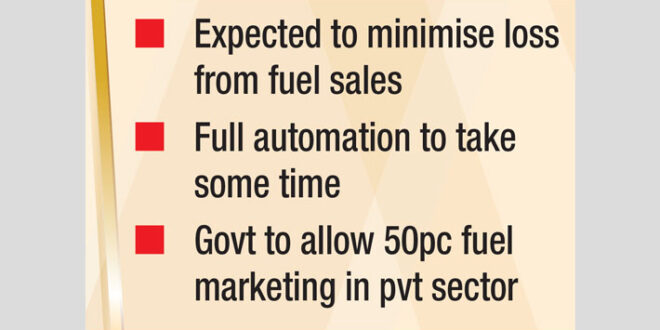In a significant move towards aligning domestic fuel prices with international benchmarks, the government is set to introduce an automated dynamic fuel-pricing formula this month.
This initiative follows a recommendation from the International Monetary Fund (IMF) to align domestic fuel tariffs with international market rates.
State Minister for Power and Energy, Nasrul Hamid, informed the Daily Sun, “I have directed the Bangladesh Petroleum Corporation (BPC) to finalise the automated dynamic fuel-pricing formula this month, as we plan to implement it soon.”
He expressed hope that this new formula would significantly reduce losses from diesel sales.
The dealers and the transport commission are also expected to accommodate the new pricing system.
As a condition for approving a $4.7 billion loan for Bangladesh, the IMF also stipulated that the country adjust its fuel tariffs. The first tranche of the loan, amounting to $476.2 million, was disbursed in early February. The IMF is expected to visit next month to review the loan’s implementation.
Rising petroleum fuel prices in the international market have led to a loss of Tk 13-14 per litre of diesel, an official noted. “If this trend continues, our subsidy may significantly increase,” Nasrul Hamid warned.
The energy and mineral resources division is scheduled to hold a meeting later this month to give the final shape to the automated dynamic fuel-pricing formula. Initially, the formula will be implemented manually each month before transitioning to full automation. According to an official, if the formula is implemented, domestic petroleum prices will need to be raised to keep them on par with international rates. The current retail tariff for diesel and kerosene is Tk 109 per litre, while petrol is priced at Tk 125 per litre and octane at Tk 130 per litre.
On August 5, 2022, the Energy and Mineral Resources Division increased the price of diesel by Tk 34 to Tk 114 per litre, petrol by Tk 44 to Tk 130 per litre, and octane by Tk 46 to Tk 135 per litre. Prices were subsequently reduced by Tk 5 per litre following a cut in fuel tax.
The state minister said the government also plans to include a justification for duties in the automated fuel pricing formula. “If international oil prices continue to rise in the coming months, our losses could increase significantly,” he cautioned.
Bangladesh currently grapples with escalating fuel costs, consuming 7.5 million tonnes of diesel annually at an expense of $6 billion. Hamid stated that the pricing formula would initially be implemented manually before becoming fully automated.
Additionally, Hamid revealed that the government is considering opening up 50 percent of fuel marketing to the private sector, much like the import process for LNG. However, he did not provide a timeframe for this move.
The new pricing strategy aims to align Bangladesh with several other countries, including India, that have already adopted automated fuel pricing systems.
Said Shafiqul Alam, Energy Finance Analyst for the Institute for Energy Economics and Financial Analysis (IEEFA) for Bangladesh, highlighted the potential benefits of the government’s decision to adjust fuel oil prices in accordance with the international market.
First, such a policy could reduce the necessity for future subsidies, particularly if import costs rise. Second, it would mitigate the risk of consumers facing sudden and steep hikes in fuel costs.
Alam pointed to the crisis of August 2022, when the government dramatically elevated petroleum prices by 41 to 52 percent, as a cautionary tale. That abrupt increase disproportionately impacted poorer and lower-income individuals, and also contributed to rising inflation.
Thirdly, Alam noted that if international prices were to decrease, the local populace would benefit from lower fuel costs. Although monthly adjustments are a positive first step, he suggests the government should consider more frequent updates, citing India’s daily price revisions as an example.
However, Alam cautioned that aligning with international prices is not the ultimate solution.
To significantly reduce the subsidy burden on the power and energy sectors—an objective recommended by the IMF—the government must also focus on accelerating the adoption of renewable energy and limiting reliance on expensive power plants.
Additionally, securing renewable energy at competitive rates is crucial for lowering the average cost of power generation in the country, thereby further alleviating the subsidy burden, he added.
(DS)
 Welcome to Business Outlook
Welcome to Business Outlook




